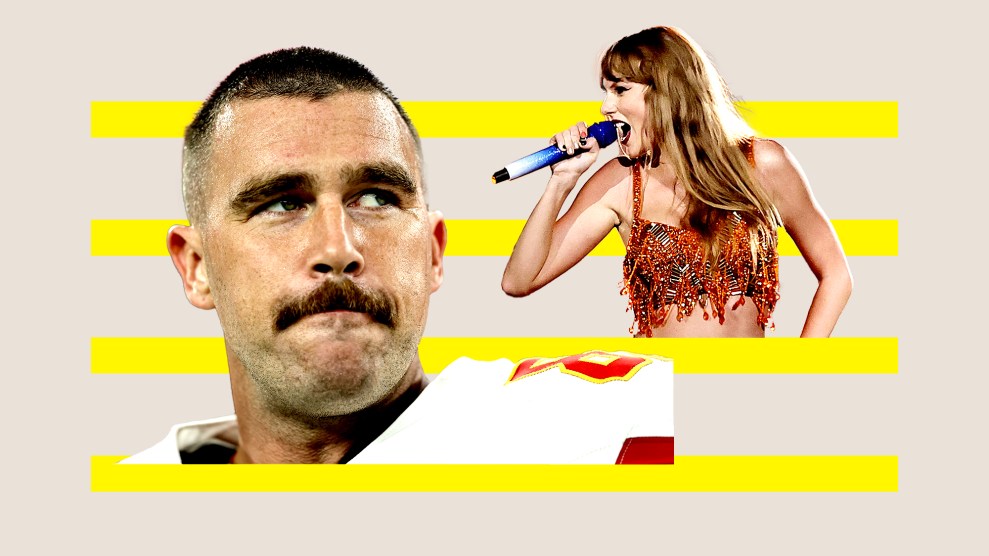
Mother Jones; Michael Owens/Getty, Bob Levey/TAS23/Getty
Unless you live in a bubble, one that floats far above the heights of the internet, you have received word that Taylor Swift went to a football game this weekend.
That attendance, which continues to produce some of the best memes I’ve seen in some time, appeared to confirm the steady hum of rumors that the most famous American woman was indeed dating—or at least, willing to publicly associate herself with—Travis Kelce, the All-Pro tight end for the Kansas City Chiefs. And for one entire football game, a nation’s collective obsession fixated on Swift’s every move from inside a luxury box at Arrowhead Stadium. Her gameday windbreaker. The friendly rapport she appeared to enjoy with Kelce’s mother.
Brands were also watching. In the days since Swift showed up at a football game, where the singer was spotted eating ketchup and “seemingly ranch” with a single chicken tender, marketers at some of the country’s largest companies have pounced with a parade of absurd responses. Many took place in the mentions. Others imagined bigger: Heinz unveiled a limited-edition “ketchup and seemingly ranch” condiment, with a release of only 100 bottles, the sum of 13 and 87, Swift’s favorite number and Kelce’s jersey number, respectively. The buffet of capitalism continued with alcohol review sites hawking vodka in honor of Swift possibly drinking cranberry vodka at the game. Elsewhere, news that sales of Kelce’s jersey surged 400 percent since Swift’s Kansas City trip appeared to delight fans marveling at the pop icon’s economic impact.
Even in an age when marketers race to capitalize on everything from racist killings to gender identity, I struggle to think of a previous instance in which a cultural moment activated such an intense reaction, as brands fight for proximity to the world’s highest-paid female entertainer. The execution has been undeniably corny, shameless in its thirst for virality, but perhaps excused because, after all, this is tabloid fodder. But it’s a bit unsettling to witness deeply capitalistic tendencies so openly celebrated as everything from jersey sales to the pair’s collective net worth becomes something to salute. That the weekend’s fervor played out against the backdrop of the NFL, an organization that reaps vast profits off violent entertainment, doesn’t help me shake off the uneasiness. I felt a similar discomfort watching, even in jest, the patriotic approval of Swift conducting a situationship with a large, all-American man following a string of British, and apparently smaller, men.
It’s not wrong—just as it was not wrong to date tiny British boys—but there’s something a bit odd about watching an avatar of American femininity date an avatar of American masculinity in a stadium where people often chant, literally, USA. It feels extremely American to see the extent to which prowess, both financial and physical, has been so cherished in recent days. Are Swift and Kelce really dating? Maybe. But others are certainly capitalizing.
“I am a Swiftie,” Colm Dillane, the creator of the blue and white outfit Kelce wore as a nod to Swift’s 1989 album, told the New York Times. “Now I’m going to go to every tour. I’m going to buy her merch. I think she made more money off of me than I made off of her because of how much I’m going to invest in Taylor Swift for the rest of my life.”
















